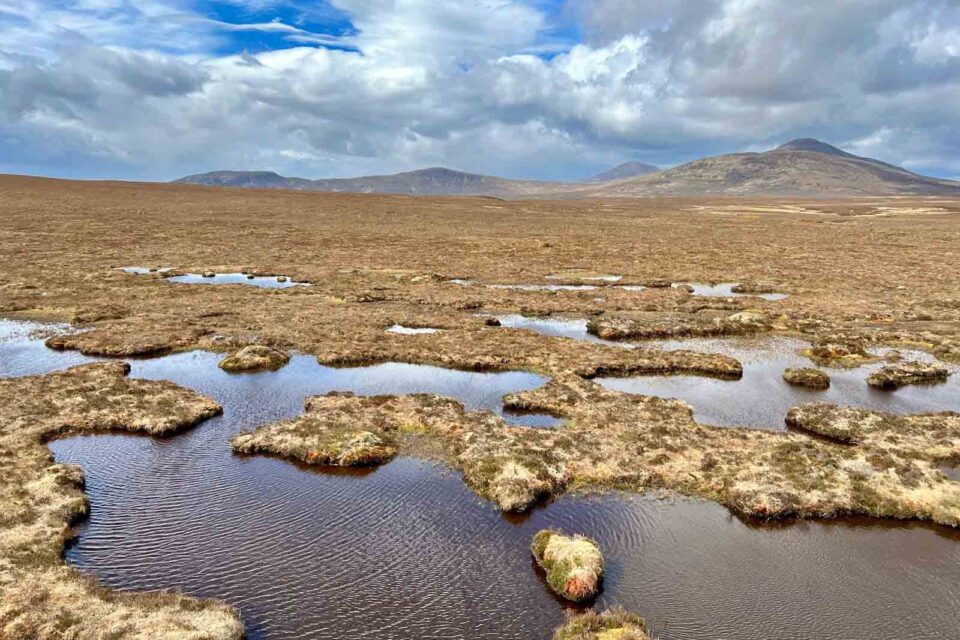New report shows peatland restoration could bring Millions to North Highlands and affirms a community-focused approach to investment
Posted On February , 2024


A pioneering study commissioned by The Flow Country Partnership and North Highland Initiative (NHI), funded by Highlands and Islands Enterprise, measuring the economic impact and business potential of peatland restoration has revealed the economic impact could reach £400 million for the local area over 18 years.
By widening access to allow smaller scale farmers and crofters to sell carbon credits, a further £1.4 to £4.2 billion could be achieved over 100 years. This signifies substantial investment into the region’s ecological future, as well as carrying promising prospects for job creation and economic stimulation.
The report, Peatland Restoration in the Flow Country Economic Impact & Business Potential Study, was undertaken by 4c Engineering with support from NatureScot, Highlands and Islands Enterprise and others.
The North Highlands region is home to the Flow Country – covering 400,000 ha, it is the largest expanse of blanket bog in Europe, storing an estimated 400 million tons of carbon, twice as much as all the UK’s woodlands combined (The Flow Country, 2020).
Stretching across Caithness and Sutherland in the far north of Scotland, an estimated 45% (180,000ha) of this peatland area is said to require restoration.
The regeneration of this could lead to the employment of 241 people over 18 years alongside the stimulation and facilitation of spin off businesses greatly benefiting local communities in the North Highlands.
In addition, healthy peatland also supports biodiversity, flood prevention, drought and wildfire mitigation, as well as improved water quality, critical factors for communities and businesses.
Businesses identified as being reliant on peatland include whisky and fishing, with tourism, education and research being considered as spin off and related industries.
The report affirms the model for community-focused carbon credits (‘Charismatic Carbon’) administered by not-for-profit Flow Country Partnership, which will allow smaller scale landowners, including those who are using common grazing, to directly reap the rewards of preserving peatland.
Genevieve Duhigg, Chair of NHI, said: “It is hard to understate the importance of the uniquely valuable and vulnerable qualities of Flow Country. Its preservation and responsible management is crucial to the success of so many endangered species, whilst developing opportunities for the people who live and work here is vital to the success of rural communities.
Above all, restoring and preserving this hugely important carbon sink is crucial to preventing climate change. This approach presents an opportunity to balance these factors in a sustainable way.”
He added: “The report not only sheds light on the economic dimensions of peatland restoration but also underscores the critical need for strategic planning, stakeholder engagement, and innovative approaches to undertake the full potential of restoring these vital ecosystems in the North Highlands.
Alongside the opportunities, challenges are also set out in this report including the availability of local skilled workers and complicated tender processes. It’s clear that our work must take account of these and be carried out in a way that supports and is supportive of local communities and businesses. ”
The report highlights the importance of pilot projects that seek to find the best way forward in terms of peat restoration. Several of these are already underway with the support of the Flow Country Partnership and The Facility for Investment Ready Nature in Scotland (FIRNS).
Joyce Campbell of Armadale Farm in Sutherland is working with The Flow Country Partnership on a pilot project to understand how best farming practices can support peatland restoration.
Speaking about the project, Joyce Campbell said: “I’m delighted to be working with a wealth of experts on this inspiring project. It’s a fascinating way of understanding how I can turbo charge the natural environment here at Armadale, whilst at the same time continue to farm and produce top quality beef and lamb as my family has done for generations.
I can honestly say this project has refreshed my approach to farming. I’m extremely keen that as the restoration work is undertaken, the local community on my doorstep feels the economic benefits of this with access to the jobs it will create.”
NHI is a not for profit organisation established in 2005 as a direct result of His Majesty King Charles III’s commitment to support the people and businesses of the North Highlands.
It is a partner in The Flow Country Partnership alongside groups including NatureScot, Forestry and Land Scotland, Scottish Forestry, The Highland Council, RSPB Scotland, Plantlife International, the Environmental Research Institute (University of the Highlands and Islands), Highland Third Sector Interface, the Flow Country Rivers Trust, Northern Deer Management Group and Highlands and Islands Enterprise.
Flow Country comprises 400,000ha across Caithness and Sutherland and is currently being considered by UNESCO for World Heritage status.

